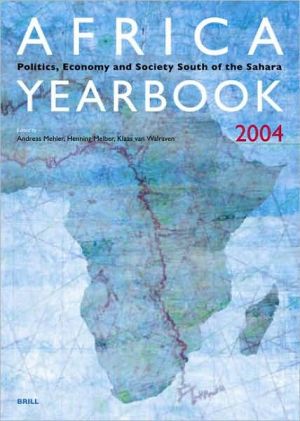Africa Yearbook 1: Politics, Economy and Society South of the Sahara 2004
The Africa Yearbook covers major domestic political developments, the foreign policy and socio-economic trends in sub-Sahara Africa - all related to developments in one calendar year. The Yearbook contains articles on all sub-Saharan states, each of the four sub-regions (West, Central, Eastern, Southern Africa) focusing on major cross-border developments and sub-regional organizations as well as one article on continental developments and one on European-African relations. While the articles...
Search in google:
The Africa Yearbook is a reliable source of reference covering major domestic political developments, the foreign policy and socio-economic trends of all sub-Saharan states – all related to developments in one calendar year. Foreign Affairs A joint project of African studies institutions in Germany, Holland, and Sweden, this volume aims to summarize the key events and developments in the 48 countries south of the Sahara in 2005 and is the second of what the authors promise will be an annual report. In the age of instant access to information, this might seem like an old-fashioned endeavor, but this collection of country and regional essays by many of Europe's top Africa specialists provides a consistently informative and fairly reliable snapshot of the region and will be useful to experts and the broader public alike. Each chapter is divided into sections on domestic politics, foreign relations, and socioeconomic development. No single theme emerges from the text, but the tone is measured and appears free of the ideological and policy agendas that mar so much of the public-sector literature on the region. Certainly, with a small number of exceptions, the country-level narratives fail to support the repeated assertions by organizations such as the World Bank that the region's reform efforts are rapidly changing socioeconomic conditions on the ground.
ISub-Saharan Africa1IIAfrican-European relations15IIIWest Africa27Benin39Burkina Faso47Cape Verde55Cote d'Ivoire61Gambia71Ghana77Guinea87Guinea-Bissau95Liberia101Mali111Mauritania119Niger125Nigeria133Senegal149Sierra Leone159Togo167IVCentral Africa175Cameroon185Central African Republic195Chad201Congo209DR Congo215Equatorial Guinea229Gabon235Sao Tome et Principe241VEastern Africa247Burundi259Comoros267Djibouti273Eritrea279Ethiopia287Kenya301Rwanda313Seychelles325Somalia331Sudan339Tanzania353Uganda365VISouthern Africa375Angola387Botswana399Lesotho405Madagascar411Malawai419Mauritius425Mozambique433Namibia443South Africa451Swaziland467Zambia471Zimbabwe481
\ Foreign AffairsA joint project of African studies institutions in Germany, Holland, and Sweden, this volume aims to summarize the key events and developments in the 48 countries south of the Sahara in 2005 and is the second of what the authors promise will be an annual report. In the age of instant access to information, this might seem like an old-fashioned endeavor, but this collection of country and regional essays by many of Europe's top Africa specialists provides a consistently informative and fairly reliable snapshot of the region and will be useful to experts and the broader public alike. Each chapter is divided into sections on domestic politics, foreign relations, and socioeconomic development. No single theme emerges from the text, but the tone is measured and appears free of the ideological and policy agendas that mar so much of the public-sector literature on the region. Certainly, with a small number of exceptions, the country-level narratives fail to support the repeated assertions by organizations such as the World Bank that the region's reform efforts are rapidly changing socioeconomic conditions on the ground.\ \








